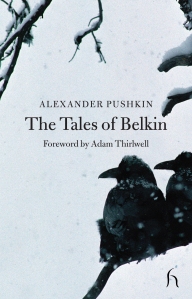The Tales of Belkin
By Alexander Pushkin
Translated by Hugh Aplin
Foreword by Adam Thirlwell
Hesperus Press, September 2009
ISBN-13: 978-1843911852
For this volume, Pushkin invented an author (a certain Ivan Petrovich Belkin) who has apparently written the five stories herein.
It is not the case that Belkin is an alter ego or heteronym of Pushkin, as say a reader or student of Fernando Pessoa would understand the matter. At least, that is not my take on it.
Belkin is simply a persona that allows Pushkin to parody and wryly explore the conventions of storytelling. He is playing something of the same game that Italo Calvino played in If on a Winter’s Night a Traveller, and there is also a kinship to Daniil Kharms’ absurdist prose works.
Originally published in 1831, these ludic (yet insidiously compelling) yarns touch on honour, vengeance, love, duels, elopement; and in one story myriad macabre happenings that turn out in the end to be a dream… Fairy-tale tropes are in evidence and so too is the storyteller’s familiar, Coincidence.
Another of Belkin’s efforts, a history of a village, is included along with the stories. In this important work, the great writer as well gives an account of his literary development from epic poet to middling local historian.
‘A Fragment’ ends the book. This very short piece (and for once ‘piece’ does not mean ‘work’, that is to say ‘whole’) describes a fictional poet, a literary figure of Pushkin’s imagination, a brother of Belkin perhaps.
One crucial thing this volume achieves is to make you realise how close Kharms is to Pushkin; a proper son of Pushkin was he. There are some clues as to this relationship. Kharms wrote an amusing riff called ‘Anegdotes from the Life of Pushkin’, as well as a weird little play where Pushkin and Gogol take turns falling over each other.
Both of these are well worth a read, but after you’ve read this excellent book, of course. It has been excellently translated by Hugh Aplin and Adam Thirlwell’s foreword is chockful of insights about the writing of fiction – and about the author of the author of these tales.

